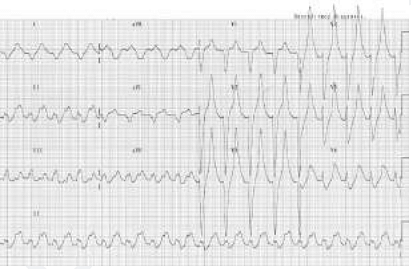Question:
A patient who is a known case of hypertension on multiple anti-hypertensive medications came to OPD. His ECG finding is given below. Which of the following drugs is responsible for the ECG finding?

A patient who is a known case of hypertension on multiple anti-hypertensive medications came to OPD. His ECG finding is given below. Which of the following drugs is responsible for the ECG finding?


Updated On: Jun 19, 2025
- Prazosin
- Metoprolol
- Hydrochlorothiazide
- Spironolactone
Hide Solution
Verified By Collegedunia
The Correct Option is D
Solution and Explanation
To determine the drug responsible for the ECG finding, we need to understand how each anti-hypertensive medication can affect ECG readings. Spironolactone, the correct answer, is a potassium-sparing diuretic. Its primary function is to retain potassium in the body while promoting salt and water excretion. Elevated potassium levels, or hyperkalemia, can significantly alter ECG findings.
Here's how each drug affects ECGs:
Therefore, based on the provided options and the understanding of medication effects on ECG readings, Spironolactone is the most likely culprit. Always consider patients' history and medications when interpreting ECGs for potential drug-related causes.
Here's how each drug affects ECGs:
- Prazosin: It is an alpha-blocker and does not typically lead to significant ECG changes.
- Metoprolol: This beta-blocker can cause bradycardia but does not usually affect ECG in a way that is unique for this context.
- Hydrochlorothiazide: This diuretic can lead to hypokalemia, potentially causing ECG changes like U waves and prolonged QT intervals, which are not seen here.
- Spironolactone: It can cause hyperkalemia (elevated potassium levels), leading to characteristic ECG changes such as peaked T waves.
Therefore, based on the provided options and the understanding of medication effects on ECG readings, Spironolactone is the most likely culprit. Always consider patients' history and medications when interpreting ECGs for potential drug-related causes.
Was this answer helpful?
0
0
Top Questions on Neuroanatomy
- The trigeminal nerve is the largest nerve with following branches:
A. Olfactory
B. Ophthalmic
C. Maxillary
D. Mandibular
Choose the most appropriate answer from the options given below:- CUET (PG) - 2025
- Zoology
- Neuroanatomy
- There was a question related to Shrugging off the Shoulder in Neck Surgery. What is it related to?
- NEET MDS - 2024
- Surgery
- Neuroanatomy
- A patient came to the medical OPD with complaints of polyuria. He has a history of undergoing total hypophysectomy. His Na+ levels are found to be 155 mEq/ L, urine osmolarity was 200 mOsm/L. What is the definitive management in this patient?
- NEET (PG) - 2023
- Medicine
- Neuroanatomy
- A 78-year-old woman presents with a progressive decline in daily activity. She gives a history of convulsions and visual hallucinations. She does not talk to anyone and keeps looking at the sky. Pathological examination shows the presence of Lewy bodies within the neurons. What is the most probable diagnosis?
- NEET (PG) - 2023
- Medicine
- Neuroanatomy
- A male patient presented to the emergency room with seizures. He has a history of fever, headache, and confusion. An MRI brain was done, and it showed inflammation involving the bitemporal lobe. What is the most likely aetiology for this presentation?
- NEET (PG) - 2023
- Medicine
- Neuroanatomy
View More Questions
Questions Asked in NEET PG exam
Which of the following cranial nerves is responsible for the motor innervation of the muscles of mastication?
- NEET (PG) - 2025
- General Science
The normal pH of arterial blood is:
- NEET (PG) - 2025
- General Science
Which enzyme is deficient in Gaucher’s disease?
- NEET (PG) - 2025
- General Science
The anticoagulant effect of heparin is monitored using:
- NEET (PG) - 2025
- General Science
The causative agent of malaria is:
- NEET (PG) - 2025
- General Science
View More Questions